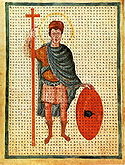Zwentibold
Zwentibold | |
|---|---|
 | |
| Born | 1 January 870 |
| Died | 13 August 900 (aged 30) |
| Spouse | Oda of Saxony |
| Children | Benedetta Cecilia Relenda |
| Parent(s) | Arnulf of Carinthia (father) Vinburga (mother) |
Zwentibold or Zventibold, Swentiboldo, Sventibaldo, Sanderbald, 1 January 870 – 13 August 900 was the illegitimate son of the Carolingian Emperor Arnulf of Carinthia.[1] In 895, his father, then king of East Francia, granted him the Kingdom of Lotharingia, which he ruled until his death.[1] After his death he was declared a saint and martyr by the Catholic Church.
Life
Early life
Zwentibold was the illegitimate son of the future Holy Roman Emperor Arnulf of Carinthia, and Vinburga (d. 18 May 898), one of his concubines. He was born during the reign of his great-grandfather, Louis the German in East Francia.
Zwentibold intervened in the scramble for the throne in West Francia (France) between Count Odo of Paris and Charles the Simple, but they began to cooperate against Zwentibold, when it became apparent that he intended to become king of West Francia himself. The eldest son of Arnulf was at first marked out for his succession in East Francia. According to the 870 Treaty of Meerssen and the 880 Treaty of Ribemont, the Lotharingian kingdom of former Middle Francia had fallen to the East Frankish realm. When in 893 King Arnulf's wife Ota gave birth to his legitimate son and successor Louis the Child, Zwentibold in compensation received the Lotharingian royal title, which last had been held by Lothair II.
King of Lotharingia

In Summer 893 Arnulf, receiving pleas of intervention against [emperor] Wido of Spoleto from pope Formosus and Berengar of Friuli, king of Italy, sent Zwentibold down the Brenner Pass with an army. Joining forces with Berengar in Verona, the two marched to Wido's capital, Pavia, and besieged it unsuccessfully, finally renouncing to the siege. According to Liutprand of Cremona, Zwentibold accepted money from Wido in order to leave, although it is not clear if it was in the form of a personal bribe or a tribute to his father. Zwentibold's retreat was nonetheless seen as a failure, but after learning details of the campaign, Arnulf summoned a stronger army and personally led it to Italy and took Pavia a few months later.
As a part of the plans to integrate Lotharingia into the East Frankish realm, the rule of King Zwentibold was enforced by his father, supported by the archbishops Herman I of Cologne and Ratbod of Trier, against the resistance of the local nobility. As he helped the common population too much, he began to be hated in a few years. He was fighting unruly nobles when his father Arnulf died in 899 and the legitimate son Louis the Child at the age of six became king of East Francia.[1]
Death
Zwentibold attempted to take advantage of the succession of his minor half-brother to establish complete independence for his Lotharingian kingdom. However, after he had lost his father's backing, the entire nobility supported Louis and asked him to intervene. In 900, Count Reginar I of Hainault rose against Zwentibold and slew him near present-day Susteren.
After Zwentibold's death, his half-brother King Louis the Child of East Francia also ruled over Lotharingia. However, under his reign the East Frankish realm disintegrated and from 903 Zwentibold's kingdom was administered by the Lahngau Count Gebhard, a scion of the Conradine dynasty, who received the title of a Duke of Lorraine.
Family
Zwentibold was named after his godfather, King Svatopluk I of Great Moravia (Zwentibold being a Frankish transcription of Svatopluk). In 897, he married Oda, a daughter of Duke Otto I of Saxony. His mortal remains are buried at Susteren Abbey. He had three daughters, who are mentioned in the Gesta episcoporum Leodensium:
Ancestry
| Family of Zwentibold | |||||||||||||||||||||||||||||||||||||||||||||||||||||||||||||||||||||||||||||||||||||||||||||||||||||||||||||||||||||||||||||||||||||||||||||||||||||||||||||||||||||||||||||||||||||||||||||||||||||||||||||||||||||||||||||||||||||||||||||||||||||||||||||||||||||||||||||||||||||||||||||||||||||||||||||||||||||||||||||||||||||||||||||||||||||||||||||||||||||||||||||||||||||||||||||||||||||||||||||||||||||||||||||||||||||||||||||||||||||||||||||||||||||||||||||||||||
|---|---|---|---|---|---|---|---|---|---|---|---|---|---|---|---|---|---|---|---|---|---|---|---|---|---|---|---|---|---|---|---|---|---|---|---|---|---|---|---|---|---|---|---|---|---|---|---|---|---|---|---|---|---|---|---|---|---|---|---|---|---|---|---|---|---|---|---|---|---|---|---|---|---|---|---|---|---|---|---|---|---|---|---|---|---|---|---|---|---|---|---|---|---|---|---|---|---|---|---|---|---|---|---|---|---|---|---|---|---|---|---|---|---|---|---|---|---|---|---|---|---|---|---|---|---|---|---|---|---|---|---|---|---|---|---|---|---|---|---|---|---|---|---|---|---|---|---|---|---|---|---|---|---|---|---|---|---|---|---|---|---|---|---|---|---|---|---|---|---|---|---|---|---|---|---|---|---|---|---|---|---|---|---|---|---|---|---|---|---|---|---|---|---|---|---|---|---|---|---|---|---|---|---|---|---|---|---|---|---|---|---|---|---|---|---|---|---|---|---|---|---|---|---|---|---|---|---|---|---|---|---|---|---|---|---|---|---|---|---|---|---|---|---|---|---|---|---|---|---|---|---|---|---|---|---|---|---|---|---|---|---|---|---|---|---|---|---|---|---|---|---|---|---|---|---|---|---|---|---|---|---|---|---|---|---|---|---|---|---|---|---|---|---|---|---|---|---|---|---|---|---|---|---|---|---|---|---|---|---|---|---|---|---|---|---|---|---|---|---|---|---|---|---|---|---|---|---|---|---|---|---|---|---|---|---|---|---|---|---|---|---|---|---|---|---|---|---|---|---|---|---|---|---|---|---|---|---|---|---|---|---|---|---|---|---|---|---|---|---|---|---|---|---|---|---|---|---|---|---|---|---|---|---|---|---|---|---|---|---|---|---|---|---|---|---|---|---|---|---|---|---|---|---|---|---|---|---|---|---|---|---|---|---|---|---|---|---|---|---|---|---|---|---|---|---|---|---|---|---|---|---|---|---|---|---|---|---|---|---|---|---|---|---|---|---|---|---|---|---|---|---|---|---|---|---|---|---|---|---|---|---|---|---|---|---|---|---|
| |||||||||||||||||||||||||||||||||||||||||||||||||||||||||||||||||||||||||||||||||||||||||||||||||||||||||||||||||||||||||||||||||||||||||||||||||||||||||||||||||||||||||||||||||||||||||||||||||||||||||||||||||||||||||||||||||||||||||||||||||||||||||||||||||||||||||||||||||||||||||||||||||||||||||||||||||||||||||||||||||||||||||||||||||||||||||||||||||||||||||||||||||||||||||||||||||||||||||||||||||||||||||||||||||||||||||||||||||||||||||||||||||||||||||||||||||||
Notes
References
- Bauer, Thomas (2005). "Zwentibold (870–900), König von Lotharingien: Ein merk-würdiger Heiliger". In Irsigler, Franz; Minn, Gisela (eds.). Porträt einer europäischen Kernregion: Der Rhein-Mass-Raum in historischen Lebensbildern (in German). Trier: Kliomedia. pp. 16–38. ISBN 3-89890-087-8.
- Collins, Roger (1999). Early Medieval Europe 300–1000, 2nd edition. Palgrave Macmillan
- Annales Fuldenses, sive Annales regni Francorum orientalis, 10th century.
- Liutprand of Cremona, Antapodosis, 10th century




